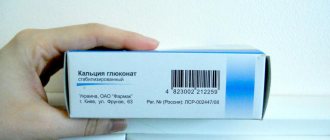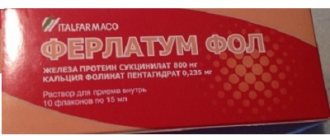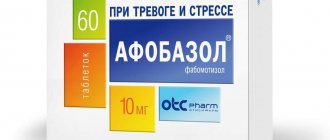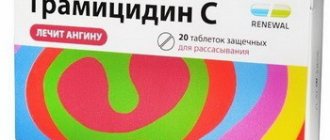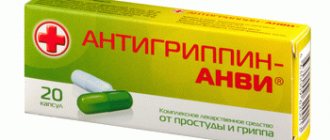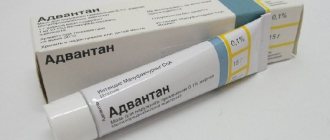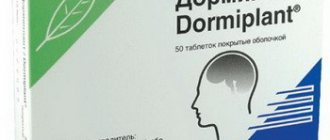The food additive calcium carbonate or “white chalk” is a substance that is most often labeled as E170 dye on food labels. Its main property is to give the product a white color. The substance is of natural origin and is not only harmless, but even beneficial for humans. In this regard, calcium carbonate has found its use in the food industry, in the production of medicines, anti-inflammatory and antacid agents, vitamins and dietary supplements. The only condition is to avoid overdosing on the substance, because in this case it can cause unpleasant symptoms.
Indications for use
Calcium carbonate has an immediate antacid effect when it enters the stomach, reacting with hydrochloric acid.
Neutralization of gastric juice provides quick relief for the following gastrointestinal diseases:
- ulcerative lesions of the stomach or duodenum;
- hyperacid gastritis (acute and chronic);
- erosion of the gastrointestinal mucosa;
- exacerbation of duodenitis;
- reflux esophagitis;
- pain and heaviness in the epigastrium;
- heartburn of any origin.
As a mineral supplement, calcium carbonate is indicated for the following conditions:
- osteomalacia;
- osteoporosis;
- caries (prevention or treatment);
- allergic reactions (as part of complex therapy);
- high body need for calcium (period of active growth, pregnancy, lactation).
Calcium carbonate is a way to compensate for the deficiency of the element that occurs when calcium absorption is reduced or its excretion is increased. Taking the supplement is necessary for patients on dialysis, taking glucocorticoids, and suffering from changes in bone tissue due to serious kidney pathologies.
When is Calcium recommended?
Taking Tianshi dietary supplements is intended for the prevention and treatment of a whole range of diseases. This is achieved by normalizing the functioning of the entire body as a single system. Therefore, drugs in this line are recommended for the following diseases:
- problems with the musculoskeletal system (arthrosis, arthritis, etc.);
- problems with joints and tendons;
- chronic fatigue, increased physical and emotional stress;
- vegetative-vascular dystonia;
- allergic reactions;
- problems with the thyroid gland;
- low hemoglobin;
- elevated blood sugar levels;
- fractures and cramps;
- neurasthenia;
- urolithiasis disease;
- general decrease in immunity;
- digestive problem.
Compound
Calcium carbonate (Calcii carbonas) is an inorganic compound, chemically a salt of carbonic acid. In nature, the mineral forms the basis of limestone, chalk deposits, dolomite, and marble.
The food and cosmetic industries use calcium carbonate as a natural food coloring under the label E-170. For medical purposes, the substance can be obtained from bone meal, oyster shells or egg shells.
Calcium carbonate (pure food chalk) is a white powder or small crystals without a specific odor or pronounced taste, insoluble in water and alcohol. The pure medical product contains 40% calcium and has no additional ingredients.
Function of calcium ions in the body:
- Neuromuscular – participation in myocardial contraction, transmission of nerve signals, movement of smooth muscles of the digestive organs.
- Enzymatic – ensuring blood clotting processes.
- Structural – as a building material for building and renewing bones and teeth.
- Signaling – transfer of information within and between cells.
Calcium is involved in many metabolic reactions, regulates cellular energy metabolism and serves as a catalyst for some reactions.
Use of E170 additive as an ingredient in food products
The food industry practically cannot do without white chalk, because it is completely harmless to humans and is approved for use by children. As a leavening agent, coloring agent, stabilizer, it is used to prepare:
- baby food;
- concentrated cream and milk;
- chocolate;
- hard cheeses.
The additive is also used to process grape juice.
In what form is it produced?
The drug is available in the form of pure powder, tablets, and chewable lozenges in various flavors.
Types of dietary supplements and medicinal preparations of calcium carbonate:
| Release form | Features of composition and packaging | average price |
| Pills | 500 mg (calcium + magnesium) in polymer jars (100 pcs.) with added vitamins | 165 rub. for 1 package |
| Powder | In polymer bags (18 kg), plastic cans of various capacities or foil bags with a dosage of 100 and 150 g. | From 200 rubles per 1 kg |
| Chewable tablets | Complexes with the addition of magnesium, zinc, vitamins (in particular C or D) and flavorings | Starting from 440 rub. per pack of 120 tablets |
The mineral is included in various multivitamin complexes. There is a soluble effervescent form of calcium carbonate in the form of tablets with the addition of vitamins C, K, B6, D. The cost of soluble tablets is about 400 rubles.
The main components of Tianshi powder with calcium
All preparations are made by fermenting calcium from natural raw materials.
In addition, the drug contains:
- B vitamins: B1, B2, B5, B12.
- Folic acid.
- Vitamins D, C, E, A, K.
- 17 trace elements: selenium, zinc, potassium, phosphorus, silicon, manganese, copper, iodine, iron, magnesium.
- Maltodextrin.
- Mono- and diglycerols.
- Dipotassium phosphate.
- Lecithin.
- Silica.
- Skimmed milk powder.
- Soybean hydrogenated oil.
- Cocoa.
- Natural flavoring – vanilla.
| 1 packet of calcium contains | Calcium with vitamins: | Children's calcium |
|
|
|
1 sachet of any calcium replenishes 40% of the daily value in the diet of an adult.
In addition, the preparations contain the following macroelements.
Pharmacodynamics
The antacid effect of calcium carbonate is observed immediately after taking the drug orally. By neutralizing the hydrochloric acid of gastric juice, the substance eliminates heartburn, reduces bloating and seething in the intestines.
The mineral has no effect on the concentration of hydrochloric acid. The antiulcer effect is also associated with a decrease in acidity, which reduces pain and promotes healing of lesions.
Calcium carbonate is a non-absorbable antacid.
Calcium carbonate is a fast-acting symptomatic remedy. Its effect lasts for several hours, but then the secretion of gastric juice is restored and intensified.
The supplement can also be used to replenish calcium deficiency. Additional intake of the mineral stimulates the renewal of bone and tooth tissue and inhibits bone degradation.
As a preventive measure
The drugs can be used for prophylaxis in the following situations:
- with increased mental and physical stress (calcium capsules, Tienschi Biocalcium for children);
- under stress;
- for problems with skin, nails and hair caused by a lack of calcium;
- for teenagers for proper bone development and hormonal changes;
- to prevent problems with teeth and gums;
- with deterioration of memory, vision, headaches and convulsions;
- to equalize the psycho-emotional background (relieve fatigue, attacks of aggression and general malaise).
Pharmacokinetics
Under normal conditions, 15% of calcium carbonate is absorbed in a healthy small intestine. This figure increases significantly in the presence of vitamin D, under the influence of parathyroid hormone, and with a balanced diet. The absorption of a macronutrient increases when it is deficient due to the lack of dairy products in the diet.
In plasma, almost half of the absorbed mineral is complexed with proteins. With the blood flow, calcium ions are delivered to all organs and tissues. 99% of the substance is spent on building bone tissue, the rest is found in plasma, cells and intercellular substance.
Calcium is excreted 80% through the intestines, almost 20% through the urine, trace concentrations are eliminated through sweat.
Maximum calcium adsorption in the intestine is achieved with single doses of no more than 500 mg. When prescribing large daily doses, it is advisable to divide the entire amount into several doses. The bioavailability of the mineral also depends on the level of intestinal acidity and dietary habits.
Application
To replenish the body's daily need for calcium, different categories of patients require different daily doses. The amount of the drug is calculated individually. So, with a dairy-free diet, a microelement deficiency may be observed, which can be replenished by adding from 500 to 2000 mg of calcium carbonate.
Powder or tablets are taken with food or after meals. Take the drug with regular (still) water or juice. Some foods containing high concentrations of oxalic acid block the adsorption of calcium ions.
Do not combine the supplement with sorrel, spinach, beets, cabbage, rhubarb, nuts or legumes. This combination provokes the binding of calcium and the deposition of oxalate stones in the kidneys and bladder.
For better absorption of the mineral supplement, food should be rich in protein, magnesium and phosphorus. The best combination is fish, dairy dishes, butter, eggs, herbs, and whole grain flour products. Calcium carbonate does not combine well with both too fatty and lean foods.
For children under 18 years old
The hypoallergenic nature of the drug allows it to be used from an early age. The restriction for children under 3 years of age is due to the ability to swallow tablet forms. In pediatrics, calcium carbonate preparations should be used strictly according to indications.
With a normal diet containing dairy products, uncontrolled additional intake of the drug can provoke milk-alkali syndrome (the effect of calcium overdose).
If it is necessary to treat and prevent rickets or caries in children, as well as during intensive skeletal growth, the supplement is prescribed in individually calculated doses from 300 to 600 mg per day. Adolescents after reaching 14 years of age are prescribed the drug under general conditions.
For adults
In addition to the listed indications, the macroelement is used for recovery from injuries and fractures; with the addition of magnesium, the substance helps to increase the endurance of skeletal muscles and myocardium during prolonged physical activity. But most often the drug is used as a fast-acting antacid.
Calcium carbonate is a safe emergency remedy to help the stomach in one-time cases of heartburn for the following reasons:
- ethanol intoxication;
- nicotine overdose;
- adverse reaction to medications;
- coffee abuse;
- diet violation.
The tablets are swallowed without chewing, the powder is mixed with water and drunk. The usual dose of the drug as an emergency antacid is 500 or 1000 mg (1-2 tablets). If additional calcium intake into the body is necessary, the dose is calculated based on the indications. Usually prescribed 1000 mg per day for body weight up to 80 kg. The duration of the course of treatment is selected individually.
For pregnant
A high need for calcium is one of the important features of the gestation period. Additional intake of the mineral is also necessary during lactation.
At this time, the drug is prescribed to women if there is insufficient presence of dairy products in the diet with symptoms of macronutrient deficiency. It is allowed to use calcium carbonate as a natural antacid for toxicosis, reflux, and heartburn.
The teratogenic properties of the drug have not been studied; no negative reviews have been reported about the use of white chalk during pregnancy or lactation. The only side effect of the drug is constipation with long-term use.
For the elderly
Too much calcium can be more dangerous than too little calcium at any age. The use of the drug is especially carefully prescribed in old age, when the normal processes of the gastrointestinal tract, filtration mechanisms and removal of excess substances are disrupted. Therefore, elderly patients need to consult with their doctor and take into account all concomitant diseases before taking the supplement.
Indications for supplemental calcium intake in patients over 50 years of age:
- prevention and compensation of osteoporosis;
- hypertension, hypotension, unstable blood pressure;
- pathologies of the thyroid gland with leaching of calcium from the body.
Loss of calcium from bone tissue occurs in postmenopause, with arthritis, cancer, and kidney damage requiring dialysis. A prophylactic dose in the absence of serious pathologies is from 600 to 1200 mg per day. Chronic and acute conditions require medical supervision and individual calculation of the treatment course.
Iron and iodine
Iron deficiency can cause the appearance and development of problems with the respiratory system, as well as cause low hemoglobin, general constant fatigue, and reduce oxygen supply to organs and systems.
Lack of iodine can cause disruption of the proper functioning of the thyroid gland and the development of related diseases, reduce the body's immunity and impede energy metabolism. Chronic iodine deficiency for women can cause the development of breast cancer.
Taking Biocalcium Tiens and children's calcium will help restore the balance of these macroelements and improve overall well-being. With low hemoglobin, you should also combine the use of these drugs with Tianshi Spirulina in capsules (blue-green algae containing many trace elements, proteins and other nutrients.).
Contraindications
Strict restrictions on taking calcium carbonate are the following diseases:
- individual intolerance to the drug;
- hypercalcemia, hypercalciuria;
- metastasis to bone tissue;
- myeloma, sarcoidosis;
- overdose of vitamin D;
- severe stages of atherosclerosis;
- renal failure, nephrourolithiasis;
- phenylketonuria;
- danger of thrombosis.
Use powder and tablets with caution if you are prone to constipation, low blood pressure, or insufficient gastric secretion.
Overdose
Excessive doses of calcium can be obtained not only from an incorrectly calculated course of treatment. An overdose can be caused by taking the supplement against the background of normal consumption of the mineral from foods.
In any case, the following symptoms are signs of excess mineral:
- headache;
- strong thirst;
- lack of appetite, up to complete refusal to eat;
- problems with bowel movements;
- myalgia and joint pain;
- weakness, lethargy, apathy.
Such symptoms indicate the development of hypercalcemia, called milk-alkali syndrome. The condition occurs when more than 2000 mg of calcium enters the body in 24 hours. With prolonged overdose, the condition develops into alkalosis (blood acidification) - a life-threatening condition.
At the first suspicion of an overdose, gastric lavage, sorbents, and symptomatic treatment are prescribed. The use of calcium carbonate is discontinued until medical consultation.
Side effects
A rare side effect when using calcium carbonate is an allergic rash and itchy skin. The effects are transient and disappear after discontinuation of the drug. More often, when taking mineral supplements, increased thirst and difficulty with bowel movements are noted. A common consequence of taking an antacid is a secondary increase in secretion several hours after administration.
Calcium carbonate, without foreign impurities or additives, is a neutral, safe substance in prophylactic doses, which very rarely causes individual reactions opposite to those expected: pain in the epigastric region, diarrhea, flatulence.
Reviews
Yana, 33 years old
I am a gynecologist, and I prescribe calcium carbonate to all pregnant women for the proper development and growth of the fetus in the womb. This affordable drug is on the shelves of any pharmacy. It tastes a little unpleasant, but it helps to get rid of the risk of tooth and hair loss for the expectant mother. Do not neglect the medicine.
Vitaly, 29 years old
When I have heartburn, I take CaCO3 or calcium carbonate. I have antacid tablets on hand, which I quickly wash down with water and save myself from unpleasant symptoms. I've been using them for over five years now and have never noticed any side effects. The tablets work quickly, are not addictive, and are available for sale. I recommend everyone try it!
Ivan, 40 years old
My youngest son is growing rapidly, so the doctor advised me to give him extra calcium. This is necessary so that the bones develop proportionally and are not fragile. My wife and I chose the simplest carbonate powder for him - we give it with food so that the child grows without problems. The taste is a little confusing, but my son is already used to it and understands what is needed.
Zinaida, 67 years old
To prevent osteoporosis, the doctor prescribed me calcium carbonate. I obeyed, but did not feel any changes. I went to see another doctor, and he replaced carbonate with citrate, saying that it had a better effect. It seemed so to me, I stopped experiencing pain, plus, as I was told, the risk of developing kidney stones has decreased.
Drug interactions
When taken orally simultaneously with calcium carbonate, absorption may be inhibited and the effectiveness of the drug may be reduced.
When combined in one course, the following reactions with drugs are observed:
- with tetracycline antibiotics – a decrease in their effectiveness;
- with thiazide diuretics – hypercalcemia and alkalosis;
- with indomethacin – reduction of its adsorption;
- with levothyroxine – decreased effectiveness;
- with quinidine – increased toxic effects on the kidneys;
- with salicylates (aspirin, pepto-bismol, others) - decreased serum concentration and accelerated excretion by the kidneys.
Laxatives, diuretics, anticonvulsants, and steroids reduce the bioavailability of calcium carbonate. Antagonists of the mineral in the body are calcitonin, gallium nitrate, and bisphosphonates. These drugs may be used to treat overdose.
Storage conditions and periods
Powdered medical chalk is stored in its original packaging, or packaged in containers made of neutral material with a tight seal. Leave the substance in a dry place, out of reach of children. The optimal storage temperature for edible chalk is +25 °C; refrigeration is not required.
Calcium carbonate powder retains its properties for up to 5 years. Tablet preparations are stored according to the instructions, in accordance with the expiration date of the most perishable ingredient.
Analogs
Direct analogues of calcium carbonate for the active substance are tablet forms, in which the substance is supplemented only with auxiliary neutral ingredients (starch, povidone, cellulose and others) to give shape and improve solubility.
Such means include:
- Vitacalcin;
- Scoralite;
- Upsavit Calcium;
- Additive calcium;
The price for these analogues starts from 40 and does not exceed 70 rubles. per package.
Tablet preparations based on calcium carbonate with accompanying mineral supplements or vitamins have a similar effect with additional properties. The most popular combinations are products with magnesium.
Rennie
A combined preparation based on calcium and magnesium carbonate with flavoring and plasticizing additives. Rennie chewable tablets are most often used for heartburn, belching, and acid reflux. Thanks to its easily soluble composition, the product takes effect in 3 minutes.
Rennie is prescribed for both symptomatic therapy and long-term treatment. The degree of absorption of calcium and magnesium from the drug does not exceed 10 and 20%, respectively. Therefore, in acute conditions, up to 10 tablets per day are allowed.
The drug is approved for use during pregnancy to relieve symptoms of toxicosis and dyspeptic symptoms. Due to its low adsorption, Rennie cannot be considered as a means to replenish calcium deficiency in the body. The cost of a package of Rennie chewable tablets (12 pcs.) does not exceed 170 rubles.
Tams
Chewable mint lozenges based on two carbonates: magnesium and calcium. They have the same indications for use as other analogues (for example, Rennie), but due to the presence of sucrose, they are not prescribed to diabetics. The tablets are taken orally, dissolving, 2 pieces one after the other. It is allowed to repeat the dose after 2 hours. The maximum amount of the drug in 24 hours is 16 lozenges.
The drug is recommended for symptomatic treatment and cannot be prescribed for long-term therapy. The drug produced in Great Britain costs about 950 rubles. per pack of 60 tablets.
Calcium-D3 Nycomed
Calcium carbonate with calciferol (vitamin D-3) is especially well absorbed and compensates for the lack of several essential elements in the body. This property requires especially careful adherence to recommended standards due to the danger of overdose.
Features of the drug:
- Children over 3 years of age are prescribed the drug on the recommendation of a pediatrician on an individual basis;
- from 5 to 12 years - no more than 1 time a day, 1-2 tablets, according to indications;
- after reaching 12 years of age, you can use an adult prophylactic dose - 1 tablet up to 2 times a day;
- adults with large body weight or for special indications are allowed to increase the frequency of administration to 3 times 1 tablet;
- Duration of therapy for established calcium deficiency, osteoporosis - at least 4 weeks;
- Do not use the drug for chronic kidney diseases.
The product is used mainly as an additional source of calcium and magnesium. The antacid effect of the drug is secondary. Other analogues of the product with calciferol: Ideos, Revital, Natekal D3.
The cost of a package of chewable tablets Calcium-D3 Nycomed (60 pcs.) with different flavors starts from 400 rubles.
Vitrum Osteomag
The drug combines calcium carbonate, magnesium, calciferol and several macro- and microelements that promote health and restoration of bone tissue: copper, manganese, zinc, boron. The supplement is especially indicated for elderly people with developing osteoporosis and bone fragility.
According to strict indications, the drug can be prescribed from the age of 12. The maximum daily dose for any age is 2 tablets. The complex supplement Vitrum Osteomag, packaged in 30 tablets, is available at a price of 300–350 rubles.
Calcium carbonate is part of many mineral and vitamin complexes designed for different ages, selected according to indications.
This is a safe mineral supplement that helps compensate for the deficiency of an important element, but if used unjustifiably, it becomes the cause of severe hypercalcemia, disrupting the functioning of the entire body. Therefore, you should consult a specialist before taking it.
Calcium carbonate
Active substance:
Calcium carbonate
Pharmgroup:
Antacids
Average price in pharmacies
| Name | Manufacturer | average price |
| Calcium gluconate 0.5 n10 tablet/ubf | URALBIOPHARM | 6.99 |
| Calcium gluconate 0.5 n120 tablet | EVALAR | 84.00 |
| Calcium gluconate 0.5 n20 tablet | PHARMSTANDARD | 32.00 |
| Calcium gluconate 0.5 n20 tablet/tathimpharm/ | TATHIMPHARMA PREPARATIONS | 19.99 |
| Calcium gluconate 0.5 n30 tablet/ubf | URALBIOPHARM | 28.00 |
Analogs for the active substance:Additive calcium Vitacalcin Precipitated calcium carbonate UPSAVIT Calcium |
